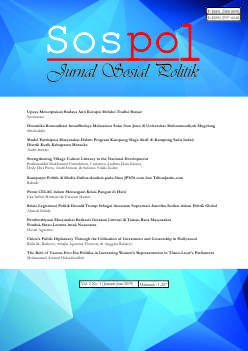The Role of Caucus Feto Iha Politika in Increasing Women’s Representation in Timor-Leste’s Parliament
DOI:
https://doi.org/10.22219/sospol.v5i1.8006Keywords:
Caucus Feto Iha Politika, Gender, NGO, Political Participation, Timor LesteAbstract
Woman had been neglected from the political affairs in the early of post-independent era. It raised the concerns of women activists on political participation. They realized Timorese women had played a significant role in fighting for independence along with male veterans. Caucus Feto Iha Politika appears as the prominent NGO in Timor-Leste that promoting gender equality in politics. It resulted the rising of women’s representation in Timor-Leste Parliament significantly. Moreover, its woman participation in parliament achieves the highest percentage in the Asia Pacific. This research lies on the question of how does the role of Caucus Feto Iha Politika in increasing women’s representation in parliament of Timor-Leste. The data obtained from primary and secondary sources by conducting the in-depth interview and library research. In order to answer the research question, the authors reiterated the three main components of NGOs roles –implementer, catalyst, and partner by Lewis as the analytical framework. The authors humbly concluded that for increasing the number of women MPs, Caucus Feto Iha Politika played two prominent roles, as follows: 1) catalyst, by advocating the policy change of women-friendly legislative quota policy to the Government of Timor-Leste, and 2) partner, by working closely with the related stakeholders to increase the capacity of potential female candidates and elected women MPs through capacity building.Downloads
References
Books
Anheier, H. K. (2005). Nonprofit Organizations: Theory, Management, Policy. New York: Routledge.
Ballington, J., & Dahlerup, D. (2006). Gender Quotas in Post-Conflict States: East Timor, Afghanistan and Iraq. In D. Dahlerup (Ed.), Women, Quotas, and Politics. New York: Routledge.
IDEA. (2003). The Implementation of Quotas: Asian Experiences Quota Workshop Report Series. Stockholm: International Institute for Democracy and Electoral Assistance.
Keck, M. E., & Sikkink, K. (1998). Activists Beyond Borders: Advocacy Networks in International Politics. Ithaca: Cornell University Press.
Kemitraan Indonesia. (2014). The Role of the Parliamentary Women's Caucus in Promoting Women's Participation and Representation: A Case Study in Indonesia and Timor-Leste. Jakarta: Kemitraan Bagi Pembaruan Tata Pemerintahan.
Lewis, D. (2001). The Management of Non-Governmental Development Organizations: An Introduction. London and New York: Routledge.
Lewis, D. (2010). Nongovermental Organizations, Definition and History. In H. K. Anheier, & S. Toepler (Eds.), International Encyclopedia of Civil Society. New York: Springer.
Lewis, D. (2015). Non-Governmental Organizations and Civil Society. In A. Riaz, & M. S. Rahman (Eds.), Routledge Handbook of Contemporary Bangladesh. London: Routledge.
Lewis, D., & Kanji, N. (2009). Non-Governmental Organizations and Development. New York: Routledge.
Ospina, S. (2006). A Review and Evaluation of Gender-Related Activities of UN Peacekeeping Operations and Their Impact on Gender Relations in Timor-Leste. Dili: The United Nations Department of Peacekeeping Operations (DPKO) .
Ospina, S. (2006). Participation of Women in Politics and Decision Making in Timor-Leste: A Recent History. Dili: United Nations Fund for Women (UNIFEM).
United Nations. (2007). Intergovernmental Negotiations and Decision Making at the United Nations: A Guide (2nd updated ed.). New York: United Nations Non-Governmental Liaison Service (NGLS).
Interviews
Araujo, P. F. (2019, January 9). Director of Caucus Feto Iha Politika. (M. A. Hidayahtulloh, Interviewer)
Exposto, A. (2019, January 9). Interim Executive Director of Rede Feto. (M. A. Hidayahtulloh, Interviewer)
Menesez, N. S. (2019, February 10). Elected Woman MP. (M. A. Hidayahtulloh, Interviewer)
Journals
Alvarez, S. E. (1999). Advocating Feminism: The Latin American Feminist NGO 'Boom'. International Feminist Journal of Politics, 1(2), 181-209.
Charlesworth, H., & Wood, M. (2002). Women and Human Rights in the Rebuilding of East Timor. Nordic Journal of International Law, 71, 325-348.
Costa, M., Sawer, M., & Sharp, R. (2013). Women Acting for Women. International Feminist Journal of Politics, 15(3), 333-352.
Cummins, D. (2011). The Problems of Gender Quotas: Women's Representation on Timor-Leste's Suku Councils. Development in Practice, 20(1), 85-95.
Dahlerup, D., & Freidenvall, L. (2005). Quotas as A 'Fast Track' to Equal Representation for Women. International Feminist Journal of Politics, 7(1), 26-48.
Demirdöğen, Ü. (2012). The Role of International Organizations in the Adoption of Gender Quotas: Afghanistan and Iraq as Case Studies. Conference of the International Political Science Association. Madrid.
Dibie, J., & Dibie, R. (2012). Non-Governmental Organizations (NGOs) and the Empowerment of Women in Africa. African and Asian Studies, 11, 95-122.
Djuyandi, Y. (2016). The Role of Non-Governmental Organization (NGO) in Advocating the National Security Bill. Jurnal Bina Praja, 8(1), 163-173.
Elbers, W. (2016). Book Review: David Lewis: Non-Govermental Organizations, Management and Development, 3rd edn. International Journal of Voluntary and Nonprofit Organizations, 28(5).
Everett, J. (2011). Challenge and Co-optation: Women's Movements, NGOs, and Advocacy Coalitions in Asia. Critical Asian Studies, 33(3), 439-445.
Gwiazda, A. (2017). Women in Parliament: Assessing the Effectiveness of Gender Quotas in Poland. The Journal of Legislative Studies, 23(3), 326-347.
Hughes, M. M., Krook, M. L., & Paxton, P. (2015). Transnational Women's Activism and the Global Diffusion of Gender Quota. International Studies Quarterly, 59, 357-372.
lieva, L. (2006). The NGO Role in Advocacy for the Human Rights of People with Disabilities in Bulgaria. Monitoring Human Rights and the Rule of Law in Europe.
Kareithi, R. N., & Lund, C. (2012). Review of NGO Performance Research Published in Academic Journals between 1996 and 2008. South African Journal of Science, 108(11-12).
Keck, M. E., & Sikkink, K. (2002). Transnational Advocacy Networks in International and Regional Politics. International Soial Science Journal, 51(159).
Kim, D. (2011). Catalysers in the Promotion of Migrants' Rights: Church-Based NGOs in South Korea. Journal of Ethnic and Migration Studies, 37(10), 1649-1667.
Leung, Y. K., Leung, Y. W., & Yuen, T. W. (2016). The Contribution of Advocacy NGOs in Governance through Cultivating of a Participatory Culture: Case Studies in Hong Kong. Universal Journal of Educational Research, 4(3), 490-500.
Marcinkute, L. (2011). The Role of Human Rights NGO's: Human Rights Defenders or State Sovereignty Destroyers? Baltic Joutnal of Law & Politics, 4(2), 52-77.
Nimu, A. (2018). Surviving Mechanism and Strategies of Gender Equality NGOs in Romania and Poland. Voluntas, 29, 310-332.
Nyamugasira, W. (1998). NGOs and Advoacacy: How Well Are the Poor Represented? Development in Practice, 8(3), 297-308.
Omungo, P. A. (2011). A Review of the Role of Civil Society in Advocacy and Lobbying for Enforcement of Health Policy in Kenya. African Population Studies, 25(1), 77-91.
Schwindt-Bayer, L. A. (2009, February). Making Quotas Work: The Effect of Gender Quota Laws on the Election of Women. Legislative Studies Quarterly, 34(1), 5-28.
Tripp, A. M., & Kang, A. (2008, March). The Global Impact of Quotas On the Fast Track to Increased Female Legislative Representation. Comparative Political Studies, 41(3), 338-361.
Verge, T. (2012). Institutionalizing Gender Equality in Spain: From Party Quotas to Electoral Gender Quotas. West European Politics, 35(2), 395-414.
Yoon, M. Y. (2001). Democratization and Women's Legislative Representation in Sub-Saharan Africa. Democratization, 8(2), 169-190.
Laws and Government Policies
Constitution of The Democratic Republic of Timor-Leste. (2002). Dili.
Online Articles
UNDP Timor-Leste. (2018, May 25). Encouraging women's political participation in Timor-Leste. Retrieved January 20, 2019, from UNDP Timor-Leste: http://www.tl.undp.org/content/timor_leste/en/home/newscentre/articles/2018/encouraging-women-s-political-participation-in-timor-leste.html
Reports
Asian Development Bank. (2005). Country Gender Assessment: Gender and Nation Building in Timor-Leste. Philippines: Asian Development Bank.
Asian Development Bank. (2014). Timor-Leste Country Gender Assessment. Mandaluyong City: Asian Development Bank.
Caucus Feto Iha Politika. (2017, September 21). Presentation. Participacao Mulher Na Politica. Dili.
CEDAW Committee. (2009). Concluding Observations of the Committee on the Elimination of Discrimination against Women: Timor-Leste. New York: CEDAW Committee.
NGOs Working Group on CEDAW Alternative Report. (2009). NGOs Alternative Report: Implementation of the Convention on the Elimination of All Forms of Discrimination Against Women (CEDAW) in Timor-Leste. Dili: NGOs Working Group on CEDAW Alternative Report.
Websites
Rede Feto. (2019). Rede Feto Member Organizations. Retrieved January 28, 2019, from Rede Feto: http://www.redefeto.tl/page/members
Downloads
Published
How to Cite
Issue
Section
License
Authors who publish with this journal agree to the following terms:
- Authors retain copyright and grant the journal right of first publication with the work simultaneously licensed under a Creative Commons Attribution-ShareAlike 4.0 International License that allows others to share the work with an acknowledgement of the work's authorship and initial publication in this journal.
- Authors are able to enter into separate, additional contractual arrangements for the non-exclusive distribution of the journal's published version of the work (e.g., post it to an institutional repository or publish it in a book), with an acknowledgement of its initial publication in this journal.
- Authors are permitted and encouraged to post their work online (e.g., in institutional repositories or on their website) prior to and during the submission process, as it can lead to productive exchanges, as well as earlier and greater citation of published work (See The Effect of Open Access).

This work is licensed under a Creative Commons Attribution-ShareAlike 4.0 International License.



















